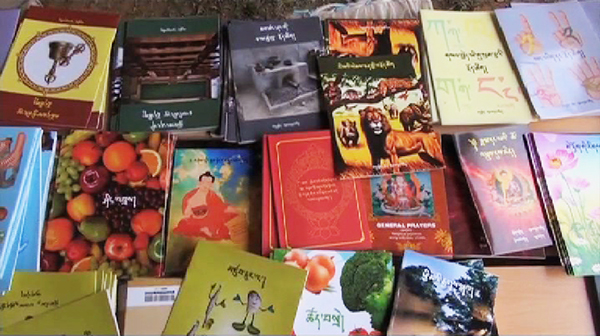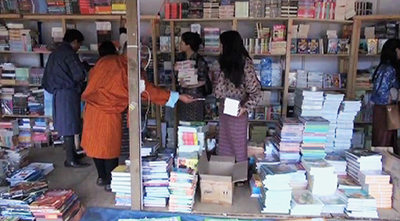 Books are windows for past, present and future, the Tsirang Dzongda urged representatives from schools including teachers, librarians and principals to go for books which will benefit the students at large during the 12th National Book Fair which began from May 21.
Books are windows for past, present and future, the Tsirang Dzongda urged representatives from schools including teachers, librarians and principals to go for books which will benefit the students at large during the 12th National Book Fair which began from May 21.
Schools from 14 western Dzongkhags and three thromdes along with 38 book vendors from across the country are taking part. It is learned that local writers and Dzongkha writers in quality and quantity have picked up over the years. However, some vendors claimed that Dzongkha books are the last to be bought.
Book vendors displayed their books ranging from children book to international best selling novels while local books both in English and Dzongkha were also visible. Meanwhile, there are few vendors who believe that Dzongkha books are the least to be bought and it’s done to fulfil the criteria only.
“There are only few Dzongkha book buyers, I believe if the government could institute more Dzongkha classes in the schools then it would facilitate promotion of our national language and promote Dzongkha writers. Today in my stall 99% of the books are Dzongkha books that are published in the country. We have books for students of pre-primary school to the higher secondary level,” Pema Tashi, a book vendor, said.
“I personally feel that there are not many who are keen in buying Dzongkha books. Buyers give the first priority in buying English books, which I believe is wrong conception. Because we have limited Dzongkha booksellers whereas other English books are available everywhere; the Internet provides all assistance and even books online which the buyers need not worry about not being able to procure. For Dzongkha we can find only a few online,” Sonam Tshering, another book vendor, said.
 The fair organized jointly by Ministry of Education, Royal Education Council and book vendors was focused to create a platform for the buyers, which are mostly schools, in procuring varieties and quality books for students back in school. Buyers were also provided with a discount of 20% from the MRP. Buyers/school representatives were also advised to buy books that are not older than 10 years of its edition.
The fair organized jointly by Ministry of Education, Royal Education Council and book vendors was focused to create a platform for the buyers, which are mostly schools, in procuring varieties and quality books for students back in school. Buyers were also provided with a discount of 20% from the MRP. Buyers/school representatives were also advised to buy books that are not older than 10 years of its edition.
“It is to make the procurement system little simpler. The schools need not have to follow the procurement system. The fair is also one way of promoting the habit of reading, and over the years we have seen many good qualities of Dzongkha writers and readers, so we can say that the fair also basically helps and promotes local readers and local writers to come up with new titles and books every year,” Sangay Tshering, a focal person from the Royal Education Council, said.
“Today we have only a few local authors and they publish only a handful number of books. If we could publish local books with higher standard and if the number rises I am sure it could be otherwise. In libraries of most of the school from three books only one per cent is a Dzongkha book. However, things are getting better with more local authors coming up in recent years,” Gomchen Tenzin, the Principal of Khangkhu Middle Secondary school, said.
During the fair teachers of Higher Secondary level chose novels, short stories while that of lower secondary levels went for children books. One school was not allowed to buy books worth over Nu 10,000 from one stall for equal and fair distribution of buyers and sellers.
“We have classes from nine to twelve in our school. Our school sanctioned Nu 200,000 to procure books. So we have divided that in two categories that are for classes nine to ten and for classes from eleven to twelve,” Kinley Wangmo from Yangchenphug High School, said.
“I have discussed with my librarian in buying more Dzongkha books, but it doesn’t mean that English books are not important. We see students are more interested in storybooks and those in classes seven and eight they go for grammar books and other essential learning materials,” Peljor, a teacher from Gaupey Lower Secondary School, said.
Similar fair for the Eastern Dzongkhags will be held in the first week of June in Samdrup Jongkhar dzongkhag.







